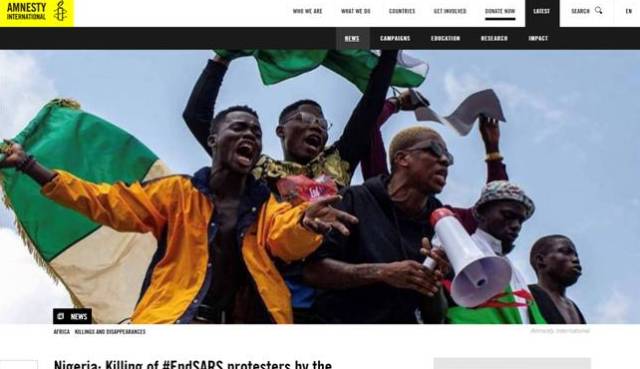
Weeks of peaceful demonstrations against police brutality ended in an apparent massacre as security forces fired on protesters ‘waving flags and singing the national anthem’ in Lagos.
Amnesty International said at least 12 people had died and hundreds were badly injured in unprovoked attacks on 20 October at the Lekki tollgate and Alaus, both wealthy districts of Nigeria’s commercial capital. It said CCTV cameras and streetlights had reportedly been switched off before soldiers fired on the crowd. Footage of the shootings circulated widely on social media. CNN quoted a witness as saying: ‘They were firing straight, directly at us, and a lot of people got hit.’ The Nigerian newspaper Punch said 43 protesters and six police officers had been killed, adding that ‘hoodlums’ had attacked the peaceful protesters but also confronted the police.
Amnesty estimated that at least 56 people had died across Nigeria since the protests began, with about 38 killed on 20 October. The United Nations’ secretary-general, Antonio Guterres, called for an end to police brutality and abuse, while the UN’s human rights chief, Michelle Bachelet, said: ‘There is little doubt that this was a case of excessive use of force, resulting in unlawful killings with live ammunition, by Nigerian armed forces.’
The Special Anti-Riot Squad (Sars) has long been widely accused of torture, corruption, extortion and rape. After days of protests calling for the notorious unit to be disbanded, the government announced on 11 October that it would scrap Sars. However, protesters claimed it was just being renamed, with no attempt to hold officers accountable. The demonstrations continued, with protesters broadening their demands to include further reforms of governance and the security services.
The authorities at first played the events down, with the Lagos state governor, Babajide Sanwo-Olu, claiming that no one had died in the ‘unfortunate shooting incident’, according to the BBC. However, tensions escalated, with gangs blocking highways, including the airport road, demanding money from motorists and chasing away police, Reuters reported. Several police stations were burnt down.
As unrest spread across Nigeria, President Muhammadu Buhari announced on 23 October that his government would meet the protesters’ demands, the BBC reported. He said at least 69 people had been killed – 51 civilians, 11 police officers and seven soldiers. A former general and coup leader, Buhari had expressed regret a day earlier for ‘innocent lives … lost’ but did not specifically mention the incident at Lekki, let alone condemn the shootings. He said scrapping the controversial squad had been seen as weakness by his government. His response further enraged protesters.
A witness of what swiftly became known as the Lekki Massacre told the Guardian that four lorries of soldiers had arrived at the site of the #EndSars rallies. A curfew had been declared hours before the shooting but more than 1,000 protesters remained, defiant and braced for violence, though not expecting the onslaught that followed. After firing one volley in the air, the security forces began shooting at the fleeing crowds, the witness said. ‘They killed so many innocent souls. I was running away and they were chasing after us. People were dying instantly, as if it was a game.’
A coalition of dozens of civil society organisations called on Buhari to sack the chief of army staff following the Lekki killings. The army denied deploying soldiers, despite footage clearly showing them at the Lekki tollgate.
The unrest erupted only weeks after Buhari announced a triumphal year of celebrations of the 60th anniversary of Nigeria’s independence, with the theme of ‘Together Shall We Be’ to forge a more cohesive Nigeria, the Nigerian Guardian reported. But the country seems increasingly polarised: the Boko Haram insurgency is no nearer a resolution, with 27,000 people killed over the past eight years. Many of the young, cosmopolitan protesters at Lekki sport tattoos and dreadlocks. It seems a modern and organised movement akin to Extinction Rebellion in its demographic sweep, photogenic savvy and progressive ambition. In the northern states under sharia law, meanwhile, a 13-year-old boy has been sentenced to 10 years for blasphemy, a humanist detained for criticising Islam, and castration mandated for rapists.
When the president won a second term last year, the Times declared that ‘the hopes of Mr Buhari’s supporters at the prospect of an end to corruption, insecurity and economic stagnation have not been realised.’ Recent events, one BBC correspondent said, were ‘galvanising a generation already disillusioned with the ruling class. The Nigerian government is running out of time to quell the growing dissatisfaction.’



